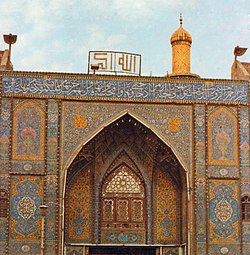Takbir
Jump to navigationJump to search
| Part of a series on |
| God in Islam |
|---|

|
| Part of a series on |
| Islam |
|---|
 |
The Takbir (تَكْبِير, pronounced [tak.biːr], “magnification [of God]”)[a] is the Arabic phrase ʾAllāhu ʾakbaru (ٱللَّٰهُ أَكْبَرُ, pronounced [ʔaɫ.ɫaː.hu ʔak.baru] (![]() listen)), meaning “God is greater”[1] or “God is the greatest”.[2][3]
listen)), meaning “God is greater”[1] or “God is the greatest”.[2][3]
It is a common Islamic Arabic expression, used in various contexts by Muslims; in formal Salah (prayer),[3] in the Adhan (Islamic call to prayer),[4] as an informal expression of faith, in times of distress or joy, or to express resolute determination or defiance.
Exegesis[edit]
The Arabic word كَبِير (kabīr) means great from the Semitic root k–b–r. The Arabic word أَكْبَر (ʾakbar) is the elative form (greatest) of the adjective kabīr. When used in the Takbīr it is usually translated as greatest, but some authors translate it as greater.[5][6][7] The term Takbīr itself is the stem II verbal noun of the triliteral root k–b–r, meaning “great”, from which akbar “greater” is derived. The form Allāhu is the nominative of Allah, meaning ‘God‘.[8][9]
Usage in Islamic rituals[edit]

The takbīr in nastaʿlīq

A Muslim raises both of his hands to recite the Takbīr in prayer.
This phrase is recited by Muslims in many different situations. For example, when they are very happy, to express approval, to prevent a Muslim from becoming prideful by reminding them that Allah is their source of success, as a battle cry, or during times of extreme stress. The phrase is not found in the Quran, which does not refer to God as akbar, but uses the name al-Kabīr “The Great” or Kabīr “Great”, commonly translated as “Most Great” (13:9, 31:30, 22:62, 34:23, 40:12, 4:34).
In prayer[edit]
The phrase is said during each stage of both salah (obligatory prayers, performed five times a day), and nafl (supererogatory prayers, performed at will). The Muslim call to prayer (adhan) by the muezzin and to commence prayer (iqama) also contains the phrase.[4]
While there are many short prayers like it, the usage of takbir is more frequent than any other short prayer.[10]
Following births and deaths[edit]
The phrase is used after the birth of a child as a means of praising God.[11] It is also part Islamic funeral and burial customs.[12]
During the Eid Festival and the Hajj[edit]
During the festival of Eid al-Adha and the days preceding it, Muslims recite the Takbīr. This is particularly the case on the Day of Arafah.[13]
During the halal slaughter of animals[edit]
The process of pronouncing the name of Allah while performing Dhabihah one must say “Bismillah Allahu Akbar”.[14]
[edit]

“Allāhu akbar” in Arabic calligraphy seen on Imam Ali Mosque architecture (center of the Iwan), 1994
The expression “Allah Akbar” can be used in a variety of situations, from celebrations to times of grief.
In a historical account by someone who was present both at the birth of Abd Allah ibn al-Zubayr and at his funeral, the author observes that “Allahu Akbar” was said on both occasions.[1]
In times of distress[edit]
The phrase is sometimes used during distress.
Just before Garuda Indonesia Flight 152 crashed into the jungle near Medan, Indonesia, the pilot screamed “Aaaaaaah! Allāhu akbar” into his radio. According to a radio communication transcript, the pilot’s conversation with the air controller had been in English, but his last words were the takbir as the plane crashed on September 26, 1997, killing all 234 people aboard in Indonesia’s deadliest crash. It was suspected that the crash may have been due to either disorientation or turbine engine failure caused by local dense smog resulting from forest fires.[15][16]
In times of joy and gratitude[edit]
Takbir can be used to express joy or surprise. It is also used as applause in religious contexts, such as after a Quran recital, as other forms of applause are considered less appropriate.[17]
When Reshma Begum was discovered alive 17 days after the 2013 Savar building collapse in Bangladesh which killed 1129 people, crowds jubilantly cried “Allāhu akbar” to express their joy and gratitude that she had survived.[18][19]
As a multi-purpose phrase, it is sometimes used by Arab football commentators as an expression of amazement,[citation needed] or even as a football chant.[20]
In battles[edit]
It has been used historically as a battle cry during war.[21] Ibn Ishaq’s Life of Mohammed narrates at least two incidents in which the phrase was used.
“When the apostle raided a people he waited until the morning. If he heard a call to prayer’ he held back; if he did not hear it he attacked. We came to Khaybar by night, and the apostle passed the night there; and when morning came he did not hear the call to prayer,’ so he rode and we rode with him, and I rode behind Abii Talba with my foot touching the apostle’s foot. We met the workers of Khaybar coming out in the morning with their spades and baskets. When they saw the apostle and the army they cried, `Muhammad with his force,’ and turned tail and fled. The apostle said, ‘Allah akbar! Khaybar is destroyed. When we arrive in a people’s square it is a bad morning for those who have been warned.'” (page 511) “So he got off his horse and came at him and ‘Ali advanced with his shield. `Amr aimed a blow which cut deeply into the shield so that the sword stuck in it and struck his head. But ‘Ali gave him a blow on the vein at the base of the neck and he fell to the ground. The dust rose and the apostle heard the cry, ‘Allah Akbar’ and knew that ‘Ali had killed him.” (page 456) [22]
Protest[edit]
During the Iranian Revolution of 1979, it was shouted from rooftops in Iran during the evenings as a form of protest. This practice returned in the 2009 Iranian presidential election protests,[23][24] which protested the election results.[25]
Usage by extremists[edit]
The phrase has sometimes been used as a battle cry by Muslim extremists. This usage has been denounced by other Muslims.[20][1]
Professor Khaled A. Beydoun writes that the association of the phrase “Allah Akbar” with terrorism has been exacerbated by mass media and television pundits. He points out that fictional films and shows also utilize it as a cinematic trope further cementing the association.[2]
On flags[edit]
The phrase Allāhu akbar is written on the center of the flag of Iraq, 22 times along the borders of the central white stripe on the flag of Iran, and beneath the Shahada in the flag of Afghanistan in white script on the central red background as determined by the 2004 draft constitution.
Iraq[edit]
During the Gulf War in January 1991, Saddam Hussein held a meeting with top military commanders, where it was decided to add the words Allāhu akbar (described as the Islamic battle cry)[26] to Iraq’s flag to boost his secular regime’s religious credentials, casting himself as the leader of an Islamic army.[27][28] Hussein described the flag as “the banner of jihad and monotheism”.[29]
In 2004, the US-picked Iraqi Governing Council approved a new flag for Iraq that abandoned symbols of Hussein’s regime, such as the words Allāhu akbar.[27][30] In January 2008, however, Iraq’s parliament passed a law to change the flag by leaving in the phrase, but changing the calligraphy of the words Allāhu akbar, which had been a copy of Hussein’s handwriting, to a Kufic script.[31][32] The Iraqi flag under Hussein had each of the two words of the phrase written in one of the spaces between the stars on the central band; the 2008 flag, while leaving the phrase in, removes the stars.
Iran[edit]
The phrase Allāhu akbar is written on the flag of Iran, as called for by Article 18 of the Constitution of the Islamic Republic of Iran.[33] The phrase appears 22 times on the flag.[34]
Afghanistan[edit]
The Afghan constitution that came into force on January 4, 2004, required that Allāhu akbar be inscribed on Afghanistan’s national flag.[35]
Waziristan[edit]
A resistance movement that fought British rule in Waziristan, Pakistan, in the 1930s used a red flag bearing Allāhu akbar in white letters.[36]
-
Flag of Afghanistan, with the phrase beneath the Shahada
-
Flag of Iraq, with stylized Kufic script, introduced in 2008
-
Flag of Iran, introduced in 1980
-
Flag of 1930s Waziristan (Pakistan) resistance movement




